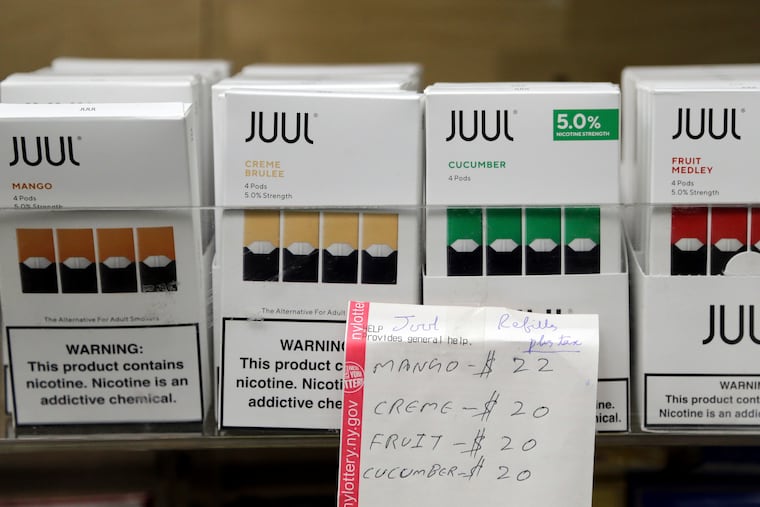E-cigarette giant Juul suspends online sales of mango and three other flavors
Juul Labs, under fire by critics who blame its products for a surge in youth vaping, announced Thursday it is suspending sales of several types of flavored e-cigarette pods in the United States.

Juul Labs, under fire by critics who blame its products for a surge in youth vaping, announced Thursday it is suspending sales of several types of flavored e-cigarette pods in the United States.
The flavors - mango, crème, fruit and cucumber - which helped fuel Juul's immense popularity, have been available only on its website to people aged 21 and over since late last year. Three other flavors - mint, menthol and tobacco - will continue to be sold online and in retail outlets. The company said it is reviewing whether to suspend sales of mint and menthol flavors.
The action comes ahead of expected Trump administration action against flavored e-cigarettes. Last month, President Donald Trump announced the Food and Drug Administration would ban all flavored e-cigarettes - except tobacco-flavored ones - in an effort to stem the increase in youth vaping. The plan hasn't been issued yet.
Juul said the sales suspension is the result of a review of Juul's practices by new chief executive officer K.C. Crosthwaite. The former Altria executive became Juul's CEO in late September, after Kevin Burns stepped down.
Crosthwaite said he wanted to "reset the vapor category by earning the trust of society and working cooperatively with regulators, policymakers, and stakeholders to combat underage use while providing an alternative to adult smokers."
Critics weren't satisfied. Juul's announcement "shows that it hasn't changed one bit under its new leadership and isn't serious about preventing youth use," said Matthew Myers, president of the Campaign for Tobacco-Free Kids. He said that the company knows the latest data shows "that 64 percent of high school e-cigarette users now use mint or menthol flavors and this number is growing all the time." He called on the administration to move forward with its plan to remove flavored e-cigarettes from the market, including mint and menthol.
Greg Conley, president of the American Vaping Association, said Juul's move was "cowardly" and would hurt adults who use e-cigarettes to stop smoking. The company "has made it clear time and time again that they will not fight for their adult customers, many of whom rely on JUUL's flavored products to stay smoke-free," he said.
Besides a continued rise in youth vaping, health authorities also are worried about the emergence of a mysterious vaping-related lung disease. Most, but not all, of the people who have fallen ill have used illicit THC, health authorities say. In an update provided Thursday, the Centers for Disease Control and Prevention said there now are at least 1,479 lung-injury cases and 33 deaths linked to vaping.
The planned FDA ban on flavored e-cigarettes, as described by officials last month, would "clear the market" of almost all flavored vaping products. Those products would not be allowed back on the market until - and if - the agency authorized them.
Juul, which has said it opposes youth use of its products, finds itself at the center of a storm over underage vaping. Late last year, under pressure from federal regulators, Juul agreed to stop selling most sweet and fruity products in retail outlets and instead to make them available only on its website with stepped-up age verification. Federal data released last month showed that the mint and menthol flavor pods that Juul continued to sell in stores have become increasingly popular among young people.
Last month, as the controversy about youth e-cigarette use intensified, Juul suspended broadcast, print and digital advertising in the United States, stopped supporting an effort to San Francisco to overturn that city's flavored tobacco ban and said it would refrain from lobbying the administration on its planned flavor ban.
The company said it believes flavored products, coupled with measures to combat underage use, can help adults stop smoking. It said it is evaluating which flavored products it will submit to the FDA for approval.
"We continue to review our policies and practices in advance of FDA's flavor guidance and have not made any final decisions," a spokesman said.
The company said it believes that the FDA review process is the best way to determine whether the items will benefit public health - the standard the agency will use in approving new products.
Meanwhile, a new poll by the Kaiser Family Foundation found that 52% of the public supports a ban on the sale of fruit- and other flavored e-cigarettes, while 44% oppose it.
The poll found that more than 80% of adults say they believe teenagers who would otherwise not smoke cigarettes are using flavored vaping products. At the same time, more than 30% of adults said they believe e-cigarettes are a safer alternative for tobacco smokers who are trying to quit.